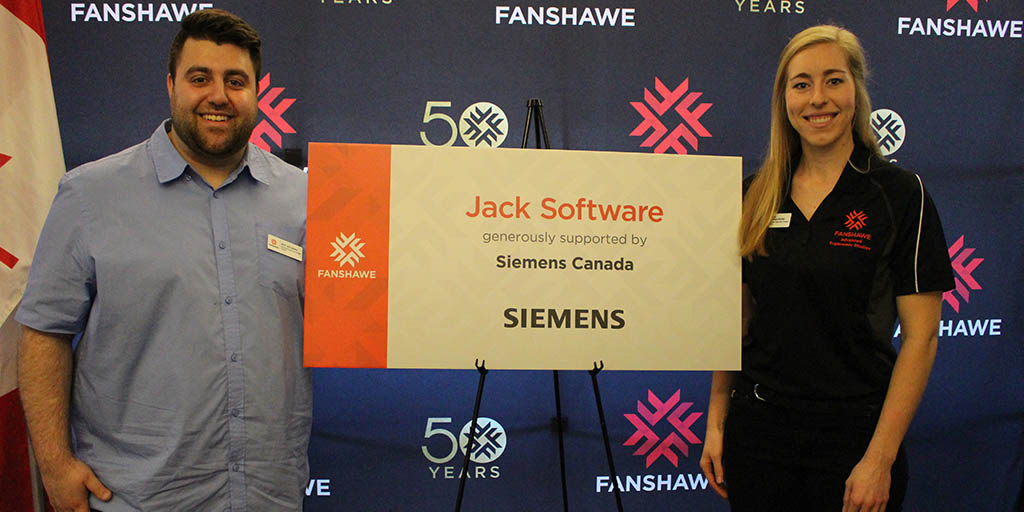School of Public Safety receive grant from Siemens Canada
 CREDIT: MELISSA NOVACASKA
CREDIT: MELISSA NOVACASKAAnna Beenackers (right) and Ary Golshan (left) are two students from Fanshawe's School of Public Safety's advanced ergonomics studies program who were present to hear the new collaboration and in-kind grant with Siemen's Canada on April 11.
Fanshawe’s advanced ergonomic studies students will have an even greater opportunity to pursue their schooling with the help of an in-kind grant on April 11 from Siemens Canada, worth a commercial value of over $28 million.
According to a Fanshawe Corporate Communications press release, with the grant, students in the School of Public Safety will be able to learn and use Jack™ software, which is part of Siemens’s product lifecycle management (PLM) software business and is a “leading edge human modeling and simulation program that is considered industry standard”.
Using Jack™ will enable students to design products and evaluate industrial tasks, which are supposed to improve comfort and reduce musculoskeletal injuries, the release said.
“This investment from Siemens ensures our students are well prepared for relevant and rewarding careers upon graduation,” Fanshawe president Peter Devlin said. “We thank Siemens for its continued support of Fanshawe and helping us unlock the potential of our students.”
“Thank you for sharing with us a wonderful thing about ingenuity for life and we’re all about innovation and creating and unlocking everyone’s potential, particularity to students, but also the faculty and staff that are at the college, as well as the communities that we support,” Devlin said at the announcement event.
With the advanced ergonomics studies program being a new one year program, Devlin was enthusiastic in explaining that students would “enormously” benefit from the collaboration and grant from Siemens.
Devlin said the college is fortunate to have the “friendship and understanding” of Siemens, along with other industry partners.
According to the release, having Jack™ software for school work, research and overall academic studies, will allow students to develop the necessary and advanced skills that will not only help them succeed in the future, it will also give them the tools that over 77,000 global customers who already use Siemen’s software and technology are familiar with.
Michael Gardiner, director of industry strategy at Siemens Canada, was excited about the collaboration.
“Siemens and Fanshawe have a shared vision to promote advanced education opportunities for students, while also ensuring that the Canadian industry has access to a highly skilled workforce trained with the most advanced technology in the world,” Gardiner said.
According to Gardiner, this is another collaborative chapter between the college and Siemens, as the company previously donated an in-kind grant to the School of Applied Sciences and Technology.
“Great things happen when industry and technology and academia come together and I think there’s a huge opportunity for Canadian students to develop skills that will support them as world leaders. They’re the future and part of that future is technology and so the better equipped they are to learn and use and innovate, I think it’s a great thing for the students and for Canada,” Gardiner said.
According to Gardiner, Siemens was happy to support the college and this new development.
“We see a huge value it’s going to provide to the community and we were very happy to support it. Fanshawe drove it, we’re here for the ride,” Gardiner said.
Gardiner said Canadian students are enthusiastic and innovative and have a drive with which Siemens is there to enable for the future.
Mark Hunter, the chair of Fanshawe’s School of Public Safety was optimistic when speaking about the collaboration since it provides “pathways to a career in ergonomics”.
According to Hunter, on top of the graduate program being the first of its kind in Canada, this project will give the students “vital” hands on experience they need with the correct software that’s being used in the ergonomic industry.
Hunter said getting to use Jack™ and other software in school gives students the opportunity to use human digital models to grow the “safety, efficiency and comfort of workplace environments in our community”.
“It allows our students to get that hands on experience that they can transition directly into the workforce and that is just cool,” Hunter said. “When you learn the theory of doing things, that’s one thing, but then being able to have the actual tools that are cutting edge, state of industry software program that you’re going to see in the workplace and then being able to use that while you’re learning to put that theory into practice is just tremendous experience.”
Anna Beenackers and Ary Golshan are two students from the advanced ergonomics studies program who had high praise for the partnership with Siemens. “You can feel the positive energy here coming from both sides, from Siemens themselves reaching out trying to help the college and students like ourselves and you could feel the energy from the president, everyone’s really excited and I think, as a student, I’m also excited we got the opportunity to be exposed to it,” Golshan said.
According to Beenackers, the fact that this collaboration is happening with the program still being new is a positive.
“I think it’s a really great way to get things rolling and I truly believe that the program’s going to have a lot of success going forward and having this access to the Jack™ software is only going to help with the success of the program. I really believe that it’s going to contribute greatly to the success of the students coming out of this program as they enter the field of ergonomics.”














